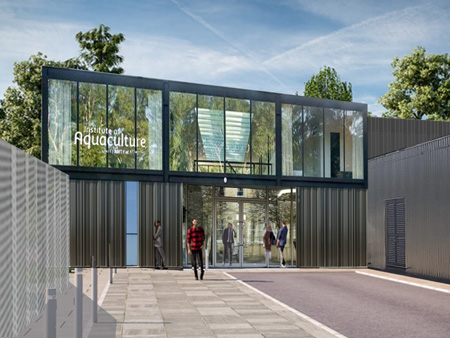
AN aquaculture and innovation facility set to open at the University of Stirling in 2024 has received a £1 million investment boost.
The National Aquaculture Technology and Innovation Hub (NATIH) is being funded through £17 million of UK Government investment as part of the Stirling and Clackmannanshire city region deal.
A further £1 million has now been received from The Wolfson Foundation. The charity awards grants to support excellence in a series of fields including science, education, and health.
The grant is hoped to support research to improve modern aquaculture practice with a focus on sustainability, and increase the economic, social, and environmental benefits of aquaculture.
Once opened in 2024, the University of Stirling said that NATIH will bring together ‘state-of-the-art’ laboratories, experimental aquatic facilities, a new tropical aquarium, and space dedicated to business incubation and acceleration.
The learning institute added that aquaculture – the cultivation of fish, crustaceans, aquatic plants, algae and shellfish in water environments – is ‘one of the world’s fastest growing sectors’, with an estimated global growth rate of 8%.
Professor Simon MacKenzie, head of the institute of aquaculture at the University of Stirling, said, “The call from the Wolfson Foundation was for high quality research with clear impact, and we’re delighted the judges recognised NATIH’s potential to support sustainable, resilient, and secure aquatic food systems that enable health and prosperity for people and for the planet.
“Building on the initial investment by the UK Government and the Institute of Aquaculture’s global network, NATIH will enable us to build an innovation community in Stirling and Clackmannanshire that nurtures jobs and skills, turning scientific research into practical, applied solutions that support economic development in communities from rural Scotland to South America, Africa and the Middle East. We welcome further investment and partnerships.”
Chief executive of the Wolfson Foundation, Paul Ramsbottom, added, “The Wolfson Foundation aims to support civil society by investing in research and education – surely ever more crucial during this challenging period.
“Our latest round of awards demonstrates the importance of capital funding for communities across the UK. The new buildings, refurbishments and equipment funded by the Foundation will support learning, enhance wellbeing and advance scientific research. While many and varied, the projects have one thing in common: they are places for people to connect, and they support imaginative and excellent work.”








